#The Letter of Tolkien
Explore tagged Tumblr posts
Text
Need y’all to know that in the 1970’s a letter to the editor was published in Daily Telegraph where the author offhandedly used the phrase “Tolkien-like gloom” to describe an area with barren trees and JRRT himself wrote back an incensed rebuttal at the use of his name in a context that suggested anything negative about trees.
45K notes
·
View notes
Text
Hot take, and I don't remember if Tolkien talks about this in his letters but:
Pippin didn't accidentally summon the Balrog. He MAY have summoned the orcs, but the Balrog would have come anyway, because - like with the Watcher In The Water - powerful ancient things are drawn to the power of The Ring. The Balrog was drawn to the ring, and I'm sure the orcs would be very curious as to why the Balrog suddenly decided to take a stroll all of a sudden.
At most, what Pippin did was to allow the orcs to work out where the Fellowship was before the Balrog got there. and this is actually a GOOD thing, because it means that the Fellowship ran away to the bridge before the Balrog could find them. If the Balrog had caught up to them before they got near to the bridge, they probably would have been a lot worse off AND the orcs would probably be following at a safe distance waiting to pick off any stragglers.
Was it a good idea for Pippin to throw rocks down a hole? (or in the PJ films' case, poke a corpse???) No, of course not. Was it a classic Tolkien case of a decision of questionable wisdom leading to a good outcome? I would argue yes.
#lotr#pippin defence squad#lord of the rings#if anyone does know if Tolkien spoke about this in his letters feel free to present his arguments to me
8K notes
·
View notes
Text
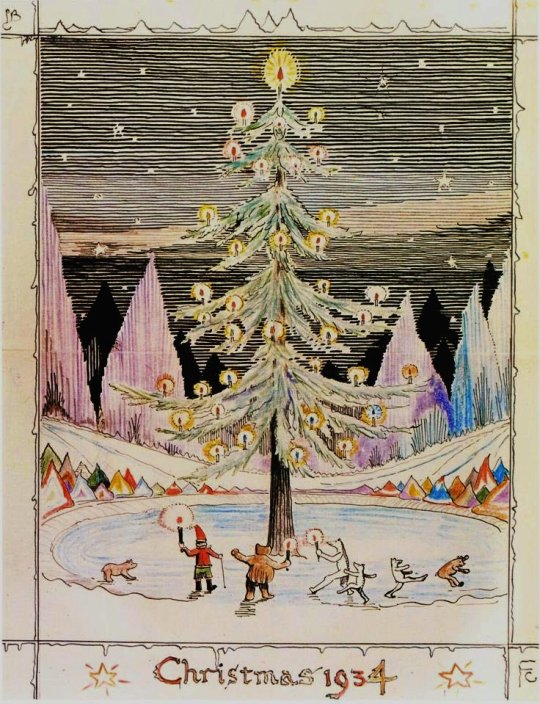
'Letters From Father Christmas' by J.R.R. Tolkien, 1920.
1K notes
·
View notes
Text
I said, outside Lichfield Cathedral, to a friend of my youth — long since dead of gas-gangrene (God rest his soul; I grieve still) — 'Why is that cloud so beautiful?' He said: 'Because you have begun to write poetry, John Ronald.' He was wrong. It was because Death was near, and all was intolerably fair, lost ere grasped. That was why I began to write poetry.
The Letters of J.R.R. Tolkien, No. 43
979 notes
·
View notes
Text

New iPad means first warm up portrait: have a Feanor ^^
#feanor#finweans#I purposefully don’t add the .. because I keep forgetting on which letter it goes#artists on tumblr#art#drawing#my art#digital art#tolkien#tolkien art#the silmarillion#procreate
634 notes
·
View notes
Text

from a letter to Michael Tolkien, The Letters of J.R.R. Tolkien
409 notes
·
View notes
Text
"sams love for frodo only made frodo worse" I say into the mic.
the crowd boos. I begin to walk off in shame, when a voice speaks and commands silence from the room.
"theyre right", they say. i look for the owner of the voice. there in the 5th row stands jrr tolkien.
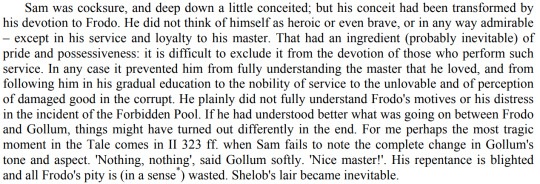
#the letters of j.r.r. tolkien#lotr#lord of the rings#frodo baggins#samwise gamgee#sam gamgee#samfro
335 notes
·
View notes
Text
I know I've ranted about it a million times, but every time someone brings up Roman, Byzantine, and Egyptian inspirations/influences on Gondor in more mainstream Tolkien fandom spaces (not me, because I don't even talk about it off Tumblr/DW), it seems like there's always someone who gets super weird and defensive about it. I've seen so many "well actually there's no need to consider any influences outside of England, mythology for England blah blah" responses.
And it's like! Oh, you want to play the decontextualized Tolkien quotes game? How about this one:
“But this [the setting of LOTR] is not a purely 'Nordic' area in any sense. If Hobbiton and Rivendell are taken (as intended) to be at about the latitude of Oxford, then Minas Tirith, 600 miles south, is at about the latitude of Florence [in Italy]. The Mouths of Anduin and the ancient [Gondorian] city of Pelargir are at about the latitude of ancient Troy [in Turkey]. Auden has asserted that for me 'the North is a sacred direction.' That is not true. The North-west part of Europe, where I (and most of my ancestors) have lived, has my affection, as a man’s home should. I love its atmosphere, and know more of its histories and languages than I do of other parts; but it is not ‘sacred’, nor does it exhaust my affections. I have, for instance, a particular love for the Latin language, and among its descendants for Spanish ... The progress of the tale ends in what is far more like the re-establishment of an effective Holy Roman Empire with its seat in Rome than anything that would be devised by a 'Nordic.'”
Or this one:
we come [in ROTK] to the half-ruinous Byzantine City of Minas Tirith
Or:
In the south Gondor rises to a peak of power, almost reflecting Númenor, and then fades slowly to decayed Middle Age, a kind of proud, venerable, but increasingly impotent Byzantium.
Or:
The Númenóreans of Gondor were proud, peculiar, and archaic, and I think are best pictured in (say) Egyptian terms. In many ways they resembled ‘Egyptians’ - the love of, and power to construct, the gigantic and massive. And in their great interest in ancestry and in tombs. […] I think the crown of Gondor (the S. Kingdom) was very tall, like that of Egypt, but with wings attached, not set straight back but at an angle. The N. Kingdom had only a diadem (III 323). Cf. the difference between the N. and S. kingdoms of Egypt.
Or:
Thank you very much for your letter. … It came while I was away, in Gondor (sc. Venice), as a change from the North Kingdom
Middle-earth is not equivalent to England, or northern Europe in general, and Gondor especially is not northern at all!
#fun fact: in the full letter it comes from tolkien concludes the mythology for england quote with 'absurd.'#and he specifically used gondor as a counter-example to the 'nordic' image of middle-earth#like it's literally explicitly stated by tolkien that gondor is not meant to be analogous to england or northern europe at all#anghraine rants#legendarium blogging#jrr tolkien#gondor#ondonórë blogging#lord of the rings#the letters of jrr tolkien#legendarium fanwank
1K notes
·
View notes
Text
Reading The Hobbit has a warm, cozy feeling to it, like sitting by a fireplace and downing a warm mug of hot chocolate. There are times when you want to cry, times when you want to laugh, times when you want to fight alongside Thorin’s Company. But at the end of the story, you realise that you will never experience that, because The Hobbit is fictional in reality, but so real in the heart and mind.
Reading The Lord of The Rings has a cool feeling, neither warm nor cold, but a comfortable one; it’s as if you’re sitting by a window, staring into the rain, and wishing you could go outside and relish in the rain but you can’t because it’s cold. There are times when you want to laugh, cry, dine with the Fellowship, fight with the Fellowship. But you can’t, because The Lord of The Rings is only a figment lodged in your heart, tucked away in a cozy spot.
Reading The Silmarillion has the feel of sitting in an enormous library almost abandoned, and fishing out an old, dusty book from a nook long forgotten, written about the history of the world. There are cases when you want to delve into that world and explore it, revel in it, fight it, love it, yell at the people in it. But you can never do that, because it is a history long past, existing only in the minds of very few.
Reading the old stories narrating the entire history of Arda has the feel of travelling back in time to the Library of Alexandria, reading and studying all the library can give. There are times when you want to cry, mourn, grieve, celebrate, laugh, revel in the world. But you can never, as that world, those people, are all part of your heart and mind, tucked away into the most precious part of you.
Reading the legendarium doesn’t make you want to be a part of that world because you love it. It makes you want to be a part of that world because the characters are normal people, like you, who got roped into an unlikely adventure, forever narrated in song, poems, ballads and laments.
They are simple stories, of simple people, in a simple world, where if you existed, you could have been one of those souls both fortunate and unfortunate.
Reading the legendarium makes you want to be part of it, because it makes you think you can survive it.
And certainly, if you have read this amazing mythological masterpiece, you absolutely can survive it.
#jrr tolkien#tolkien#silmarillion#the silmarillion#the silm#the silm fandom#lord of the rings#the two towers#the fellowship of the ring#return of the king#the hobbit#an unexpected journey#desolation of smaug#battle of the five armies#children of hurin#the tale of beren and luthien#beren and luthien#akallabeth#the fall of numenor#unfinished tales#history of middle earth#tolkien povs#the fall of gondolin#the letters of tolkien#the book of lost tales#lays of beleriand#the lost road#history of middle-earth#the return of the shadow#the nature of middle earth
374 notes
·
View notes
Text
Some have asked about the origin of the ‘Galadriel and Celeborn are nudists’ headcanon. It came to me a few months ago during an internship I held at Ancestry DNA, when I stumbled across the little known fact that famous Danish author Hans Christian Andersen was in fact—by means of an unbroken yet somewhat incestuous male line—the direct ancestor of the man we know as JRR Tolkien.
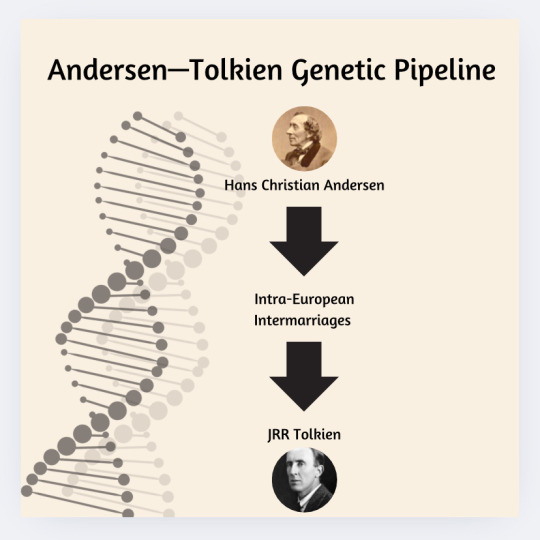
After a little more digging, I then discovered a little known pamphlet published by Tolkien and almost immediately (and justifiably) redacted by Edith, in which he described his attempt to pay tribute to his ancestor by including a reference to one of his old stories in a very early draft of The Silmarillion, as an event experienced by Finarfin, otherwise known as Arafinwë, High King of the Noldor in Aman. The story was called Kejserens nye klæder, and a summary of it is enclosed below:
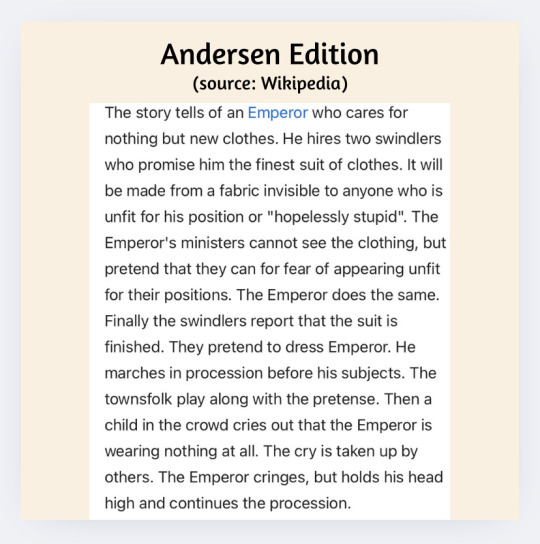
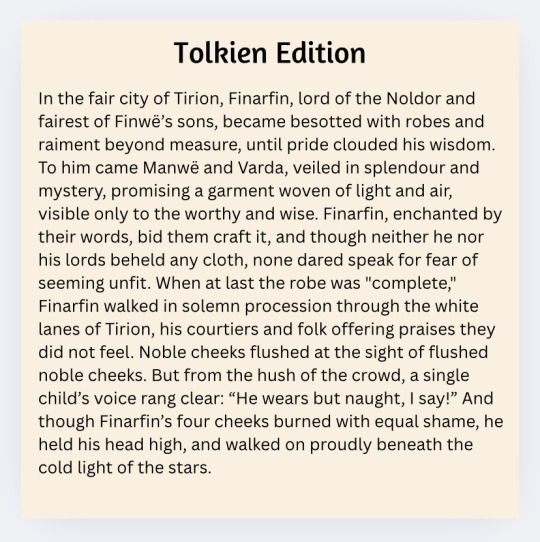
This, my friends, is the origin of my headcanon. That Galadriel, in a burst of filial devotion after hearing of her father’s proud action, his refusal to let his chin fall in the face of the Valar’s machinations, designed Lothlorien to be a nudist paradise, where one could wander in the woods to their heart’s content, cheeks flapping like the very birds that nest in the treetops.
Celeborn has no such noble motivations. Celeborn just likes a balmy breeze on his bits.
#tolkien#lord of the rings#the silmarillion#celeborn#celeborn of doriath#galadriel#finarfin#i’m sorry but if you believed this one after elves don’t shit and all the others it is your fault okay#and also the jirt letter i made up#lotr crack#silm crack#celedriel#lotr shitposting
178 notes
·
View notes
Text

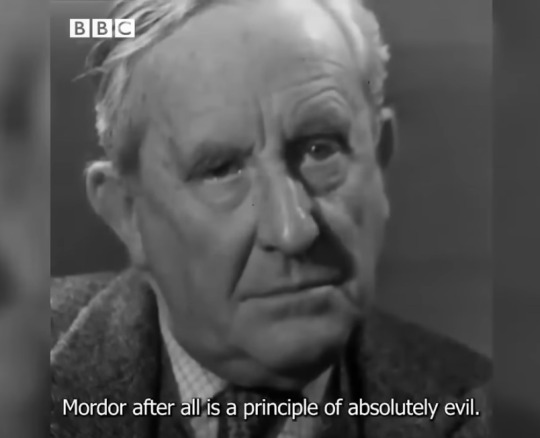
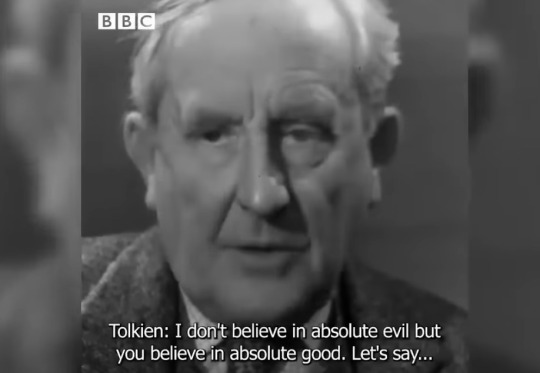
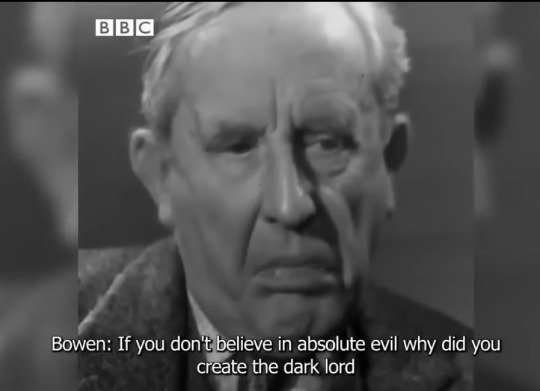
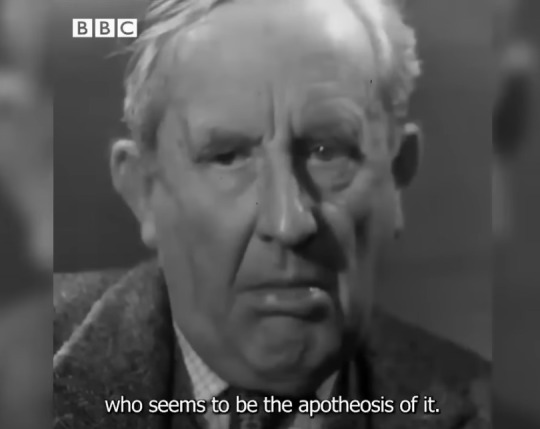
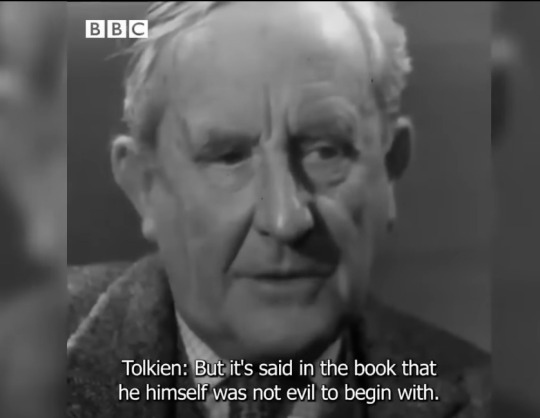

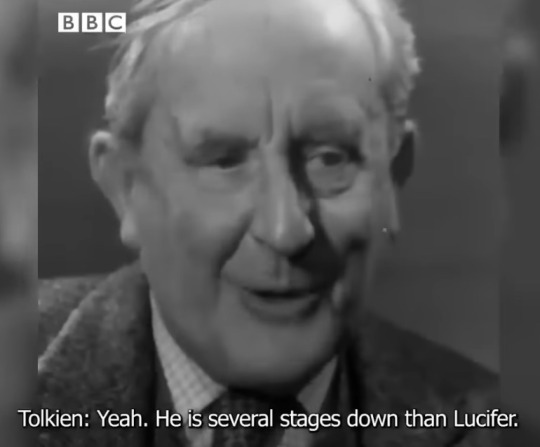
How to politely tell someone who doesn’t understand your work to fuck off: Professor Tolkien edition
Tolkien talks about Sauron and “absolute evil” in his legendarium
“In my story I do not deal in Absolute Evil. I do not think there is such a thing, since that is Zero. I do not think that at any rate any 'rational being’ is wholly evil.” […] Some critics seem determined to represent me as a simple-minded adolescent, inspired with, say, a With-the-flag-to-Pretoria spirit, and wilfully distort what is said in my tale. I have not that spirit, and it does not appear in the story.” Tolkien Letter 183
#also the “lucifer” here is morgoth not sauron#tolkien#jrr tolkien#sauron#mairon#mordor#tolkien legendarium#tolkien lore#middle earth#lord of the rings#tolkien letters
134 notes
·
View notes
Text
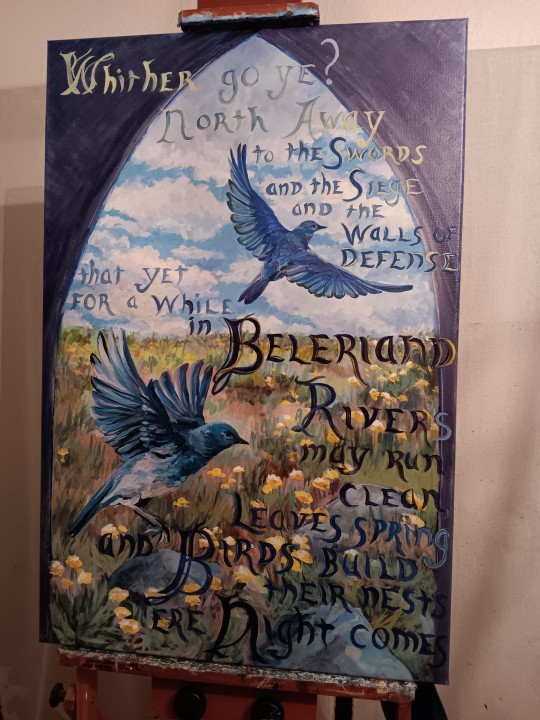
Not quite finished, but I fit all the words in.
#original painting#athrabeth finrod ah andreth#finrod#morgoth's ring#andreth saelind#beleriand#tolkien#hand lettering#inspired by illuminated manuscripts
326 notes
·
View notes
Text
One funny difference between J. R. R. Tolkien and C. S. Lewis is that Tolkien seemed entirely uninterested in writing about sex, whereas Lewis's writing was also chaste but with barely repressed kinkiness simmering just beneath the surface
#lemme put it this way#my first thought when i learned that lewis signed some of his letters as 'lover of the whip' before his reconversion#even just going by my memory of the narnia books#was 'huh that would explain some things'#tolkien#j. r. r. tolkien#j.r.r. tolkien#j r r tolkien#jrr tolkien#jirt#c. s. lewis#c.s. lewis#c s lewis#cs lewis
514 notes
·
View notes
Text
In an undated letter written in the late 1950s, reproduced in THE LETTERS OF JRR TOLKIEN, Tolkien alludes to the legal difficulties Sam faced after returning from the Grey Havens at the end of LORD OF THE RINGS:
When Master Samwise reported the ‘departure over Sea’ of Bilbo (and Frodo) in 1421, it was still held impossible to presume death; and when Master Samwise became Mayor in 1427, a rule was made that: ‘if any inhabitant of the Shire shall pass over Sea in the presence of a reliable witness, with the expressed intention not to return, or in circumstances plainly implying such an intention, he or she shall be deemed to have relinquished all titles rights or properties previously held or occupied, and the heir or heirs thereof shall forthwith enter into possession of these titles, rights, or properties, as is directed by established custom, or by the will and disposition of the departed, as the case may require.’
You can see how the residents of Hobbiton might have seen Sam's return as the premise of a kind of Agatha Christie mystery plot: favorite servant of eccentric middle-aged local resident departs on an unexpected journey with his master; returns home alone two weeks later; and then conveniently produces a copy of said eccentric local resident's new will, naming the servant the heir to all his property — and the only account the servant can offer of his master's whereabouts is a preposterous story about Elves. Suspicious! Very suspicious indeed!
#books#lord of the rings#lotr#jrr tolkien#the letters of jrr tolkien#letter 214#sam gamgee#frodo baggins#the grey havens#this is funnier if you bear in mind the scene at the beginning#where the hobbits in bywater are gossiping about whether frodo's parents actually murdered each other#rather than being *accidentally* drowned in the brandywine river
513 notes
·
View notes
Text
But there are, I fear, no hobbits in The Silmarillion ... little fun or earthiness but mostly grief and disaster. Those critics who scoffed at The Lord because 'all the good boys came home and everyone was happy ever after' (quite untrue) ought to be satisfied.
The Letters of J.R.R. Tolkien, No. 227 to Mrs. E. C. Ossen Drijver (5 Jan 1961)
513 notes
·
View notes
Text

from a letter to Michael Tolkien, The Letters of J.R.R. Tolkien
203 notes
·
View notes